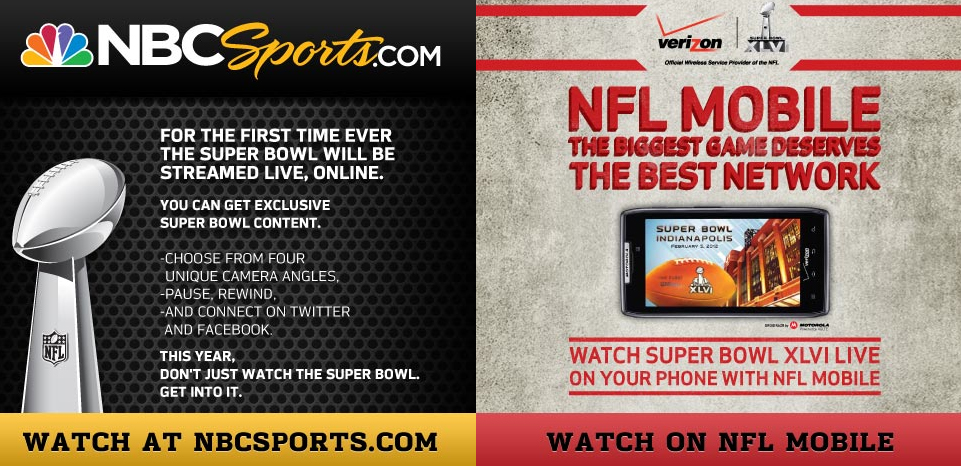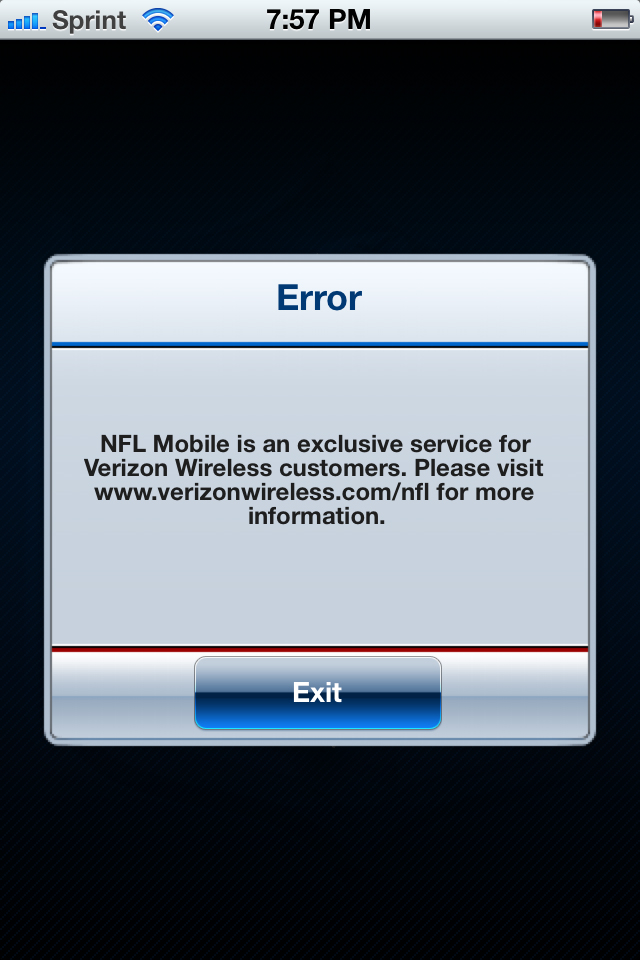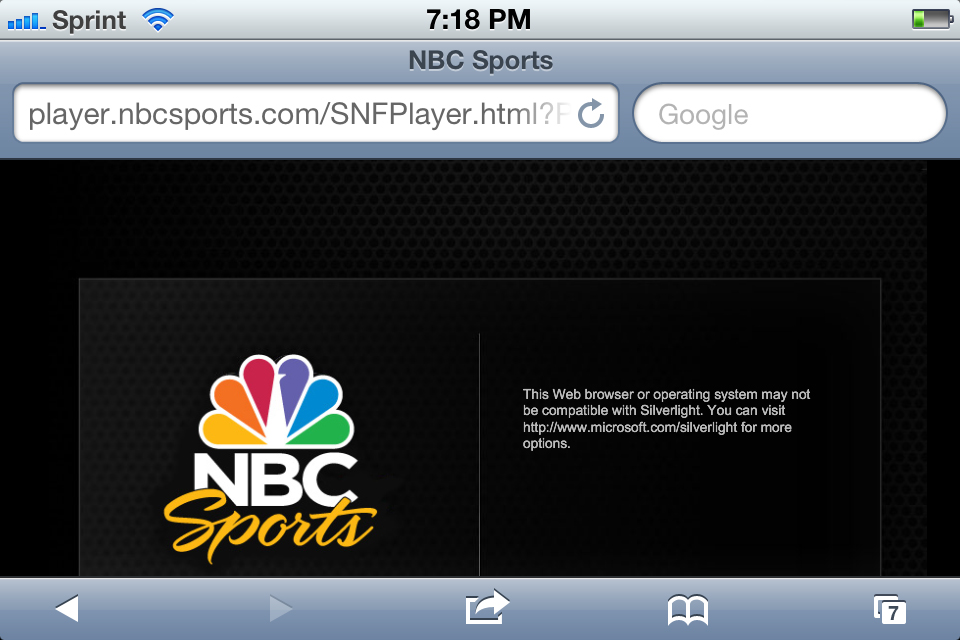Super Bowl Streaming: 2.1 Million Served
At least 2.1 million unique viewers took advantage of NBCSports.com's Super Bowl streaming buffet, according to numbers the company released on Tuesday. Yet the number of unique viewers and online testimonials tells a story quite different from the one that NBC pitched just a day before.
According to Brian Stetler of The New York Times' Media Decoder blog, NBC claims the unique visitors viewed a total of 4.59 million streams, which means that every unique viewer had to either a) restart their stream at least twice to refresh the viewing experience or b) viewers watched a portion of the game, left and then came back at a later time.
Our real-time testing found both to be the case, as mentioned in Sunday's post-game article. Based on NBC's numbers, and Stetler's NBC interview for a previous blog post, it appears that both factors were at play.
Breaking Down NBC's Super Bowl Numbers
First, we'd noted that the quality improved markedly at the beginning of the second half—following the halftime recap by Mike Florio and Randy Moss, from the "bowels of the stadium" as they described it, in lieu of Madonna's concert—indicating that a number of streaming viewers abandoned their streams to watch the concert on television or attend to other duties.
Second, the total number of minutes watched by the 2.1 unique viewers totals 78.6 million total minutes, for an average of 37 minutes per unique viewer. Assuming each viewer had to restart the stream twice, we'd be looking at less than one game's quarter—in real time—for each attempted view.
In addition, Stetler notes that NBC is blaming low-quality streams on last-mile issues or "connection issues" as Kevin Monaghan, managing director of digital media for the NBC Sports Group, calls them. While we understand NBC's attempt to minimize issues faced by fans trying to view the game, it's disingenuous for NBC to blame last mile issues for two reasons: In our tests, we found that our networks were able to stream much higher-quality live content from other sources across the same network at the same time, so the last-mile issue was not a problem in our case.
More importantly, though, there are many consistencies in the overall problems that viewers have commented on—from varying lag times compared to the TV broadcast to consistent poor quality at the height of the game's key moment, one of which Monaghan mentions—to think the issues were just isolated. Viewers from Long Island to Manhattan to Reno to Milwaukee expressed frustration in the quality of the stream and illegibility of the graphics.
It's as if, in the early days of TV, the broadcast engineer said "Hey, the signal looked good when it left our building," and it's a reminder that we're in the early days of large, live events—enough so that we can all "blame it on the blockbuster" if the event has problems.
The numbers provided by NBC also don't answer, as of yet, the questions of average length of actual view or how many commercials were viewed versus the actual game.
Super Bowl Commercials or Game Highlights?
One suspects that more than 90 percent of all views—or attempted views—were focused on the actual game and that it was a very limited number of users viewing commercials.
NBC says that 1.83 million commercials and game highlights were viewed, bringing the likely commercial viewing to less than one in every two viewers. If each commercial or game highlight were thirty seconds in length, this would account for less than 1 million of the 78.6 million minutes viewed.
Reaction to the six-commercial repeating cycle that was integrated into online game coverage was universally negative, as streaming viewers felt subjected to an endless cycle of the same commercials. Online opinions ranged from a vow never to see the movie Act of Valor to disgust over having the live stream interrupted when one chose to click on an ad, as Rainn Wilson repeatedly suggested viewers do in his Chevrolet ad. Once burned, one suspects, the majority of viewers who did choose to watch a commercial didn't go back to view a second one.
"NBC confused distribution with programming," wrote a commenter from Long Island on the Media Decoder blog, "Never again for the 8 of us who got together to watch it. As for the advertisers who DID buy the time—ACT OF VALOR in particular—I will now NEVER see that film after NBC force fed it to us over 20 times."
Viewing Times for Primary vs. Second-Screen Viewers
As for the average length question, the number of viewers commenting at various points across the blogosphere almost universally attempted to watch the entire game via streaming, which almost every one of them described as their sole source of legal access to the game. Reasons range from delayed cable installations to previous cord cutting to being in a work location without access to a television.
This idea of watching the entire game online differs markedly from NBC's concept of the streaming as a second screen, supplemental to the television, with Monaghan telling Stetler that NBC's "extensive research shows that a large percentage of consumers watch our live streams as a second-screen viewing experience, with television being the primary experience."
Based on the almost universal number of commenters across various blogs complaining about not being able to watch the game in its entirety, the anecdotal evidence of real-world attempted usage of the live stream doesn't correlate to NBC's "extensive research" on a number of levels.
As one example, if even a third of viewers were attempting to watch the whole game online, this brings the average second-screen experience down under twelve minutes. If each unique viewer had to refresh the stream at least twice, this means the average sustained viewership of any single stream was about six minutes in length.
Furthermore, those who attempted—as we did in our testing—to match the online game to the televised game found it incredibly frustrating.
"I have to give a conditional 'fail' to NBC’s online broadcast of the game, which was anywhere from three to four plays behind the live action, even showing commercials while the 'real' game was live," wrote Paul Kapustka on Mobile Sports Report. "Though I understand why technically the online show might be slower, the wide gap made it impossible to keep the laptop (or tablet) open while watching the game on TV, eliminating the whole “second screen” thing that the online broadcast was supposed to enable."
It appears that many more of the 111.3 million television viewers—a whopping 53 times the number of online viewers, if online viewers weren't attempting second-screen supplemental streaming—chose to reach for Twitter on their mobile devices or laptops outside of the Verizon Wireless NFL Mobile app or the NBCSports.com live stream.
Twitter announced that more than 14,000 tweets per second were sent during the final minutes of the game, an almost three-fold increase from the previous single-moment record during the 2011 Super Bowl.
Super Bowl Viewing on Phones and Tablets
All of this brings us back around to the idea of addressable audience, and the fact that many mobile users were also attempting to watch the game on a mobile device instead of as a second-screen experience. The numbers just don't add up.
In closing, we'd be remiss in mentioning the large unaddressable audience on the mobile front. The advertisement on NFL.com for mobile viewing (Figure 1) doesn't mention that content could only be viewed on Verizon mobile smart phones, which account for approximately one-third of all available smartphones in the United States.

Figure 1
Those who chose to download the app on other carriers' smart phones were met with an unequivocal barrier (Figure 2) and attempts to go directly to the game at NBCSports.com were met with a Silverlight incompatibility message (Figure 3).

Figure 2

Figure 3
Even some users on Verizon that downloaded the NFL Mobile app and paid the $3.00 surcharge to watch the game could not. StreamingMedia.com reader David Parker commented on our Sunday night article that he planned to watch the game on his Verizon iPhone after receiving a text offer from Verizon.
"To actually watch it you had to subscribe to Verizon Video, and you could do a one-day thing for $3," wrote Parker. "It never worked at all on my iPhone. Just got a screen saying it was loading, but nothing ever happened. A complete waste of $3. I actually tried to get it to work on 3G and wifi and it worked on neither."
We look forward to seeing more detailed breakdowns of the numbers on the Super Bowl stream—especially since NBC is claiming the stream as "a record for any sporting event shown via the Internet"—so that we can all understand how to better make the next major sporting event a successful experience for cord-cutters and second-screen viewers alike.
Related Articles
As we look toward 2026, the takeaway is not that Super Bowl advertising is getting bigger. It is getting more digital, more flexible, and more strategic. The next phase of growth won't come from adding more ads, but from rethinking how monetization shows up inside the live sports experience. Here are three predictions shaping what comes next.
06 Jan 2026
Previous Super Bowls offered less-than-satisfactory live streaming experiences. Will CBS Sports get it right for the masses this Sunday?
02 Feb 2016
The NFL's rookie Super Bowl streaming effort was marred by illegible graphics, widely varying image quality, and up to a minute time lag behind the broadcast
05 Feb 2012
Companies and Suppliers Mentioned